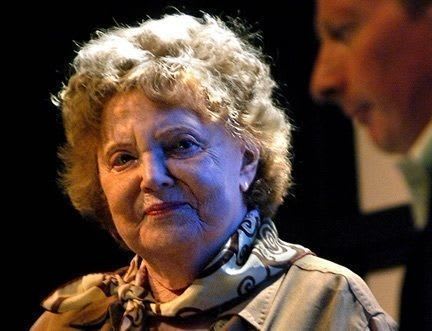In this session, radio scriptwriter Robin Brooks and BBC Radio producer Gaynor Macfarlane spoke about the process of translating Muriel Spark's early novel Memento Mori to radio drama with help from actors Crawford Logan and Alexandra Mathie.
The hour and a half session was scripted by Brooks, who was very keen to make clear how difficult a process it is to get a radio drama made in general and to make this piece in particular, especially with the BBC, which he described as "not a friendly culture". He had the actors read from the guidelines for the Classic Serial on BBC Radio 4, the slot for which they were pitching, apparently to emphasise what he was "up against", but there didn't appear to be anything particularly outlandish in its recommendations.
He said they were given an hour, although he would have preferred two, which would translate to a script of 10-11,000 words, and so the original novel would have to be radically abridged.
An interesting challenge of radio drama that isn't present in visual drama (obvious when it's pointed out to you) is that if there are more than two people in a scene and one doesn't speak for a while, they effectively disappear from the scene in the minds of the audience (the actors had anecdotes of people they had worked with adding noises, coughs, grunts or little exclamations to remind the listeners that they are there).
This novel has a large cast of characters—although some were cut for the script—three with the same surname and many of them octogenarian and posh, so to a radio audience there is a danger that they will all sound the same. They also all have detailed back-stories in the book going back 70 years that have an effect on events in the present, and so this information has to find its way into the script. According to Brooks, this is all "such hard work". Some of this background detail is filled in with narration, but he said the trouble with narration is that "it's not drama".
For a one-hour drama such as this, they get two days to work with the actors. He is given a week to write an adapted script such as this one or a month for an original script. An originated work contains lots of ideas, but for an adaptation you just have to come up with one: how to do it.
Brooks spoke of some microphone techniques and how they can be used for different effects: speaking close to mic indicates voices in the character's head; on mic is normal dialogue; off-mic is voices in the background or shouts off. Macfarlane disagreed with him about the usefulness of voices in the head, as she did with his assertion that fights can't be made to work on the radio.
Becoming more positive about his poorly-paid profession, he said that the writer does have some respect in radio drama as it is a writer's medium. The main relationship when making radio drama is between the writer and the producer, unlike the layers of management that everything has to go through for TV. Although it doesn't pay any more, the BBC iPlayer has increased the audience for his work enormously, and Radio 4 Extra is even bringing back one-off dramas from the archives that would otherwise have languished on rotting tapes in the basement of Broadcasting House.
While this particular project had its special challenges, he said that radio and the novel as media are very close together, unlike the novel and stage or screen where an adaptation has to recreate the original work in a different form entirely.
This was a fascinating and often amusing insight into writing and producing drama for radio.
